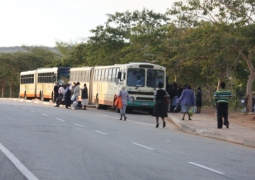
Following public outcries and constant calls for government to consider subsiding the taxi industry, the Minister of Transport Mr Joe Maswanganyi has made a commitment to meet with the different public transport operators to discuss the soon to be finalised and more inclusive public transport subsidy policy.
During the Department of Transport’s Budget Vote debate in the National Council of Provinces (NCOP) on Tuesday, the Minister announced that the government was finalising the Public Transport Subsidy Policy which, he said, will focus more on subsidising the user than the operators, irrespective of the mode of public transport they use.
“It is totally unacceptable that other modes of transport, particularly the taxis, are not included in the current subsidy regime despite the 2013 National Household Travel Survey results which indicate that taxis are the most preferred mode of public transport, accounting for more than 68% of the daily commuting public,
“Given this disparity in subsidies or lack of it, I will be meeting the taxi industry, the rail sector and the bus operators to discuss the public transport subsidy policy,” the Minister said.
The department has also finalised the process of reviewing the impact and performance of the Taxi Recapitalisation Programme (TRP).
Minister Maswanganyi said the department also conducted the National Transport Master Plan (NATMAP) 2050 Road Shows in the provinces, which aims to achieve an integrated, smart and efficient transport system supporting a thriving economy that promotes sustainable economic growth, supports a healthier life style, provides safe and accessible mobility options, socially includes all communities and preserves the environment.
The department has also successfully gazetted the draft National Land Transport Strategic Framework (NLTSF) which, the Minister said, represents an overarching, national five-year Transport Strategy that provides guidance on transport planning and land transport delivery by the national government to all provinces and municipalities.
During the debate, heavy duty trucks were blamed for causing many of the road safety and infrastructure problems in the provinces, and as a result, government has reviewed the National Freight Logistics Strategy 2005, underpinned by the “Back to Rail” strategic intervention.
“Our biggest railway deal in South Africa’s history is predicted to propel our economy to a new level of prosperity. Our investment in rail transportation is the beginning of the rolling out of the Government’s Comprehensive Rail Programme over the next two decades.
“This positions our Rolling Stock Fleet Renewal Programme as the catalyst for the transformation of our Metrorail service in particular, and public transport as a whole. Our immediate and urgent task is to stabilise and provide a predictable Metrorail service within the current capacity, measured by increased ridership, customer satisfaction and efficiency,” said the Minister.
The Department of Transport’s total budget for 2017/18 stands at R59bn, which is a 6.8% increase from the 2016/17 budget.
NCOP Delegate, Mr Mntomuhle Khawula, supported moves for the start of the process of moving heavy load away from the rods and back to rail.
He also accused the government of not giving adequate support to the taxi industry. “The taxi industry in South Africa is one of the biggest industries, employing hundreds of thousands of our people. This is a big contribution to the reduction of unemployment in the country. However, the government does not seem to be giving this industry the necessary attention it deserves, both financially and otherwise. Recently the industry had to embark on road blockages, complaining about the taxi finance which was ripping off the industry,” said Mr Khawula.
Another NCOP Delegate, Mr Simphiwe Mthimunye, welcomed the planned investment by government in the rails industry which he said will reduce congestions on the roads and reduce road maintenance costs.
“This massive investment in the rail infrastructure is also expected to reduce congestion on our roads and road maintenance costs,” he said.
By Sakhile Mokoena
21 June 2017

